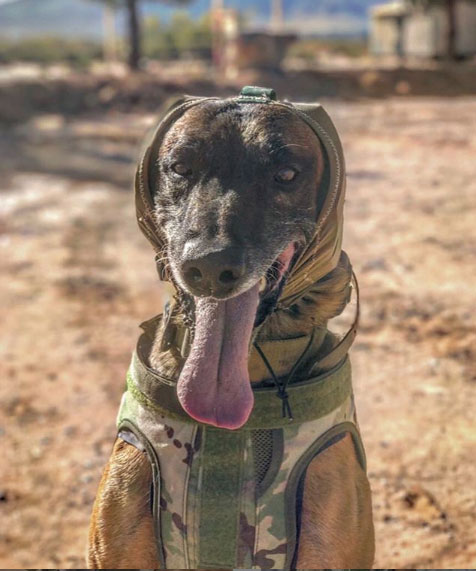'Snug' New Tech Protects Hearing, Mission Efficiency for Military Dogs

For a guy who's spent the majority of his twenty-plus year career in a basement laboratory sifting through the specifics of the biomedical world – you know, the nuts and bolts of what's physically possible and what's not – Michael McLoughlin has a surprisingly Zen-like perspective on the development of his latest product.
"Like a lot of things in life," says McLoughlin, Vice President of Research at Maryland-based Zeteo Tech, Inc., "this one just sort of began out of happenstance."
Just a few weeks ago, McLoughlin and Zeteo Tech released the results of that happenstance: the new Canine Auditory Protection System (CAPS). Backed by a Small Business Innovation Research (SBIR) grant from the U.S. Army Medical Research and Development Command (USAMRDC), CAPS is an innovative hearing protection tool – a sort of fortified hooded sweatshirt, in a sense – for military working dogs. Given that high noise levels during training, transport, operations and even boarding can cause both temporary and permanent hearing loss in canines, the CAPS tool was developed to block unwanted sounds while, at the same time, maintaining the chosen dog's ability to hear verbal commands.
"When a dog leaves a kennel, it's sort of like you and I leaving a rock concert," says McLoughlin, a former staffer with the Johns Hopkins Applied Physics Lab, trying to explain the problem in more common terms. "Your ears just don't work right immediately afterward. Do that enough times, and you can hurt your ears."
Dr. Stephen Lee, Senior Scientist with the U.S. Army Research Office (ARO) in Durham, North Carolina, backs up that point with specific, palpable data.
"I've been working with military working dogs and veterinary issues for about ten years," says Lee, "and the dogs we were studying [in this regard] were not listening to demands; we later determined hearing was a key factor."
In fact, it was the ARO that facilitated that initial brush with happenstance. Early in the CAPS development process, the ARO team encouraged Zeteo Tech to share their ideas with researchers at the University of Cincinnati; specifically retired Navy lieutenant commander Dr. Pete Scheifele. Turns out Scheifele – who works at UC's aptly-named FETCHLAB and is considered the leading animal audiology expert in the world – had the same exact goals as McLoughlin.
"He [Scheifele] noticed that when dogs were getting off the helicopter, they either weren't obeying commands or they were operating in a kind of agitated state," says McLoughlin. "So we realized pretty quickly that we needed something that was adaptable, that would stay on during operations."
Working together, McLoughlin and Scheifele created the CAPS accessory as it appears now: a lightweight, flexible pad comprised of high-quality acoustic absorption materials that covers the chosen dog's head. The pliable, almost elastic-like design – a "snood" as McLoughlin calls it – is constructed specifically for the variability of a dog's skull and, further, for preventing the animal from randomly pulling off the headgear.
"I wouldn't want to put a sleeve on my head," says McLoughlin with a chuckle, "but a dog doesn't mind that."
By all accounts, the final version is a success.
"People are buying it, it certainly has a commercial application, and I'm pushing the company to provide more because there is a need," says Lee, noting that these types of animal-related issues are relevant to a slew of other service areas, particularly for dogs working alongside military police and those partnered with U.S. Customs and Border Protection officers.
The CAPS tool's greatest relevance and impact, however, undoubtedly remains in supporting the Warfighter –both the upright and four-legged versions– in their enduring participation in an array of cross-domain maneuvers on the burgeoning multi-domain battlefield.
"The Office of Small Business Programs, in its advocacy role, is very pleased with Zeteo Tech and their ability to assist the [USAMRDC] in providing critical infrastructure protection in operational environments," says Jerome K. Maultsby, Assistant Director of Office of Small Business Programs (OSBP) at Fort Detrick.
As for McLoughlin, the electrical engineer by trade who's spent so much of his career cooped up inside one workshop or another, the CAPS project provides an opportunity to make the same kind of real-world impact he's been accustomed to over the past two decades while, also, enabling him to – happily – ditch the lab coat for once.
"I spent a lot of my life in a lab, and sometimes the things you make there don't go anywhere," he says. "It's nice to see something make a difference. It's personally rewarding."
 An official website of the United States government
An official website of the United States government
 ) or https:// means you've safely connected to the .mil website. Share sensitive information only on official, secure websites.
) or https:// means you've safely connected to the .mil website. Share sensitive information only on official, secure websites.


